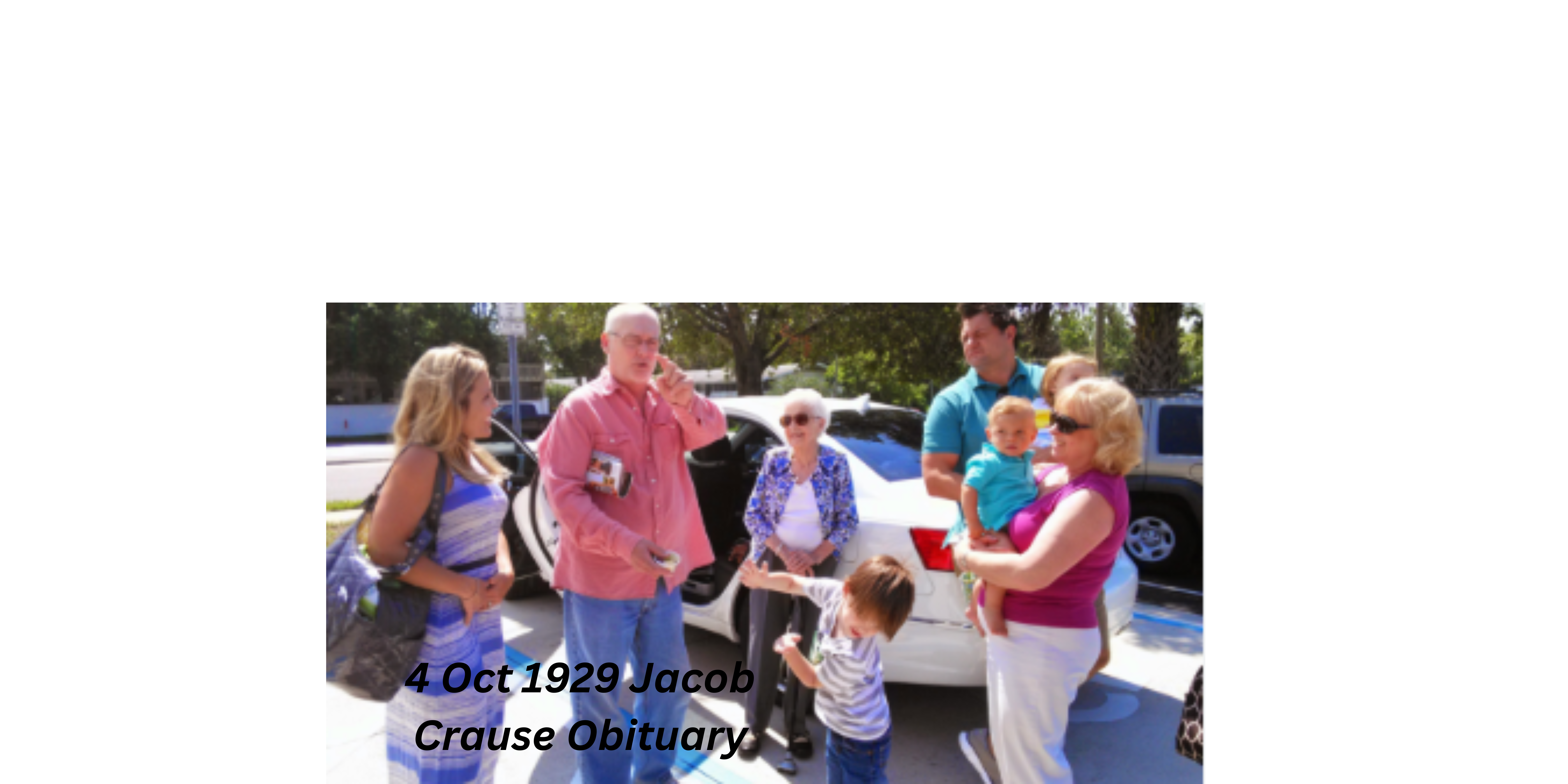The search for the obituary dated 4 Oct 1929 Jacob Crause obituary has sparked intrigue and curiosity across generations, particularly in genealogical research and historical interest. While Jacob Henry Crouse, a more recent individual, passed away on December 11, 2021.
It is essential to distinguish between the historical 1929 date and the modern obituary records associated with the Crouse family name. This article explores the significance of the keyword in depth, providing context, interpretation, and insights to uncover the broader implications of this fascinating subject.
Who Was Jacob Crause? Deciphering the Historical Record
The phrase “4 Oct 1929 Jacob Crause obituary” suggests a historical obituary potentially tied to a person named Jacob Crause, dating back nearly a century. Records from the early 20th century were often handwritten or archived in local newspapers, church bulletins, and funeral home registries.
Jacob Crause: A Speculative Identity
While little to no direct evidence of a “Jacob Crause” has surfaced publicly from 1929, historical documents often present similar names with slight spelling variations. This could mean Jacob Crause’s name was recorded differently in census data or vital records, such as Jacob Krause or Crouse. This discrepancy in names often occurs due to:
- Linguistic Translation: Immigrant families may have altered spellings of their last names for simplicity.
- Clerical Errors: Misrecording of names in early obituaries or documents.
- Regional Variants: Different parts of the U.S. recorded surnames phonetically.
October 1929: A Notable Historical Context
October 1929 was a turbulent month in American history, marked by the Wall Street Crash, signaling the start of the Great Depression. If Jacob Crause was a figure of prominence or even an everyday individual, his death during this period would likely carry a contextual narrative tied to these historical events.
The Modern Jacob Henry Crouse: A Tangible Connection
To explore potential ties between Jacob Crause and modern genealogical pursuits, we must acknowledge individuals like Jacob Henry Crouse, who passed in 2021. His lineage and records may bridge gaps in understanding.
Jacob Henry Crouse: A Legacy Remembered
Jacob Henry Crouse, born February 4, 1983, was cherished by his family and community. His unexpected passing on December 11, 2021, left behind a legacy cherished by his mother, Patricia, and the memory of his father, Karl Crouse. Though unconnected directly to 1929, the research into Jacob Henry Crouse’s genealogy offers insight into the Crouse surname’s historical patterns.
Obituaries as a Window into History
Obituaries do more than chronicle deaths; they offer insights into lives, families, and the cultural context of their times. The 4 Oct 1929 Jacob Crause obituary raises several fascinating considerations:
- Sociopolitical Context
The 1920s, often known as the Roaring Twenties, gave way to financial despair by October 1929. This timeline may have influenced how obituaries were written and circulated. - Family Lineage
Many families kept obituaries as heirlooms, sharing anecdotes and preserving family history. Tracing Jacob Crause’s lineage through such records might uncover unknown relatives or links to other historical events. - Community and Legacy
Early 20th-century obituaries emphasized community involvement, personal virtues, and family roles, providing a detailed view of societal norms.
Genealogical Exploration: Finding Jacob Crause
For genealogists or those interested in the keyword “4 Oct 1929 Jacob Crause obituary,” the following steps may help uncover related information:
1. Census and Vital Records Search
Using ancestry databases like Ancestry.com or FamilySearch.org, search for “Jacob Crause” or close name variants in the 1920 and 1930 U.S. censuses.
2. Newspaper Archives
Consult digitized newspaper repositories like Chronicling America or Newspapers.com for obituaries published around October 1929. Searching within a regional context may yield better results.
3. Church and Cemetery Records
Many families in 1929 belonged to faith communities that recorded births, marriages, and deaths. Local church archives or cemetery registries could hold valuable clues.
4. DNA Testing
Modern tools like 23andMe and AncestryDNA can help identify genetic connections that point to the Crause family lineage.
Uncovering Historical Insights Beyond the Obituary
Obituaries often paint a richer picture when analyzed within historical frameworks. For example:
- Economic Impact: If Jacob Crause’s family faced financial struggles, this may appear in property or tax records.
- Cultural Traditions: 1929 obituaries might include details about funerary practices and societal norms of mourning.
Additional Steps for Finding the 4 Oct 1929 Jacob Crause Obituary
If the 4 Oct 1929 Jacob Crause obituary remains elusive, diving deeper into the following steps can expand your research and potentially uncover valuable information:
Explore Probate and Wills
Records related to probate (the legal process following a person’s death) often contain detailed personal information, such as property ownership, heirs, and relationships. If Jacob Crause had assets or debts, these records might provide insights.
How to Search for Probate Records:
- Contact the county courthouse in the area where Jacob Crause likely lived.
- Look for online probate record databases, such as USGenWeb Archives.
- Check state-level archives, as many probate documents are preserved in state repositories.
Consult Local Historical Societies
Local historical societies often maintain unique archives that aren’t available online, including handwritten records, unpublished manuscripts, and personal letters. They may hold collections of small-town newspapers or community newsletters where Jacob Crause’s obituary could be recorded.
How to Engage with Historical Societies:
- Locate societies in the area Jacob Crause might have lived.
- Request specific assistance with surname searches in their archives.
- Ask for help identifying any name variations or regional spellings.
Investigate Immigration Records
If Jacob Crause was part of an immigrant family, his records might appear in immigration and naturalization documents. Passenger manifests, Ellis Island records, and immigration petitions can provide clues about his family and origins.
Where to Search Immigration Records:
- Access databases like Ellis Island Foundation or Immigration History Research Center Archives.
- Look for passenger lists in major U.S. ports such as New York, Boston, or San Francisco.
- Check naturalization petitions for additional family details.
Study Regional Death Certificates
Death certificates from the 1920s often include vital details such as the cause of death, family members, and burial locations. These records can lead directly to the desired obituary or provide context to find it.
How to Access Death Certificates:
- Search online through platforms like VitalChek or FamilySearch.
- Request documents from the Department of Health in the state where Jacob Crause resided.
Look Into Local Cemetery Records
Jacob Crause’s final resting place could hold key details. Cemetery records and gravestone inscriptions frequently offer personal data, such as birth and death dates, family relationships, and even epitaphs that summarize a life story.
How to Find Cemetery Information:
- Visit FindAGrave.com or BillionGraves.com for online cemetery databases.
- Contact local churches or municipal offices managing burial plots.
- Consider visiting likely cemeteries in person to locate and photograph gravesites.
Examine Military Records
If Jacob Crause served in the military, his service records may contain valuable information. Veterans often had obituaries that referenced their service, providing another avenue for discovery.
How to Access Military Records:
- Search the National Archives or military service databases like Fold3.
- Explore draft registration cards from World War I or II if Jacob Crause was of eligible age.
- Look for pension records, which may include family members’ names.
Tap Into Church Records
Churches historically documented their congregants extensively, including baptisms, marriages, and funerals. These records could include Jacob Crause’s name and potentially lead to the sought-after obituary.
How to Access Church Records:
- Contact local parishes or diocese offices in the area where Jacob Crause lived.
- Search for denominational archives; for example, Lutheran or Catholic record collections often preserve detailed accounts.
- Use local genealogical societies to guide you to church documents.
Utilize Social Media and Online Forums
Modern platforms and forums can connect you with others researching the same name or time period. Collaborative efforts often yield surprising discoveries.
Where to Engage Online:
- Join forums like Ancestry Message Boards or Genealogy.com.
- Post inquiries on social media groups dedicated to family history, such as those on Facebook or Reddit.
- Share details with broader genealogy networks for crowd-sourced assistance.
Cross-Reference with Neighboring Communities
If you cannot locate an obituary in the town where Jacob Crause lived, expand your search to neighboring towns and counties. Communities often shared newspapers, and obituaries were sometimes published in multiple locations.
How to Approach Regional Searches:
- Use a map to identify nearby towns within a 50-mile radius.
- Search for regional newspapers or microfilm archives that include obituaries from smaller communities.
- Consult county-level repositories for broader archival records.
Investigate Family Heirlooms and Oral Histories
Sometimes, the most valuable resources come from descendants or extended family. Heirlooms like family Bibles, photo albums, and personal letters may contain information about Jacob Crause’s life and death.
How to Pursue Family Sources:
- Reach out to known relatives who may hold family records.
- Conduct interviews with older family members to gather oral histories.
- Search for Crause family reunions or networks to connect with other descendants.
Hire a Professional Genealogist
If the search becomes too complex or time-consuming, a professional genealogist may offer specialized skills and access to resources unavailable to the public.
How to Choose a Professional Genealogist:
- Look for professionals certified by organizations like the Board for Certification of Genealogists (BCG).
- Provide them with all existing information to expedite the search process.
- Verify their expertise in early 20th-century U.S. records or regional genealogical research.
FAQs About the 4 Oct 1929 Jacob Crause Obituary
1. Does the “4 Oct 1929 Jacob Crause obituary” exist?
It’s uncertain whether the obituary exists in accessible public records. However, genealogical research and historical document archives can potentially uncover it.
2. How can I verify the spelling of the name “Crause”?
Check regional and historical variants, such as Crouse, Krause, or Kraus, in genealogical databases and local archives.
3. What makes October 1929 significant for historical obituaries?
The Wall Street Crash and its aftermath often overshadow personal events, which could affect how obituaries from that time were archived or circulated.
4. Where should I look for more information about Jacob Crause?
Primary sources like regional newspaper archives, census data, and cemetery registries are ideal starting points.




